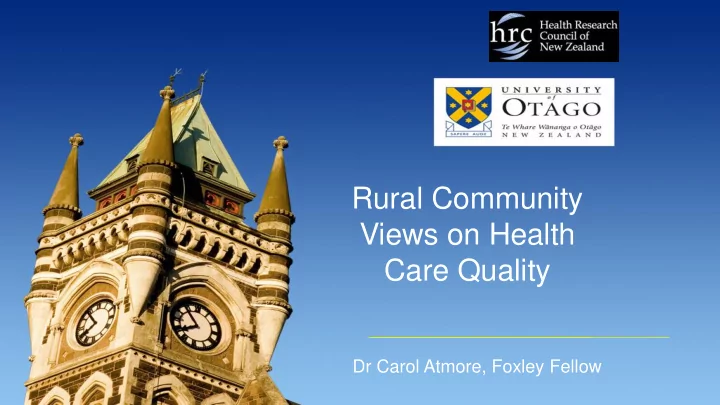

Rural Community Views on Health Care Quality Dr Carol Atmore, Foxley Fellow
Overview • Why I did it • What I did • What I found • What it means • Where to next
Acknowledgements SHARP study team
Why this? 1 in 4 NZers live in provincial New Zealand, 1 in 6 in towns less than 10,000 and rural areas Statistics New Zealand. Infoshare: Connecting you to a wealth of information. Wellington: Statistics New Zealand; [cited 2016 16 July 2016]. Available from: http://www.stats.govt.nz/infoshare/Default.aspx
Why this?
Mixed Methods R esearch… Secondary Data Analysis of Patient harms in New Zealand general practices: Records review study Susan Dovey et al Plano Clark VL, Huddleston-Casas CA, Churchill SL, O'Neil Green D, Garrett AL. Mixed methods approaches in family science research. Journal of Family Issues. 2008;29(11):1543-66.
What I did • 4 sites • Clinical leaders and managers at the DHB and in rural communities • Community focus groups and Māori hui • Semi-structured interviews • Talked, taped, transcribed • Thematic content analysis Bryman A. Social Research Methods, 4th edition. Oxford: Oxford University Press; 2012. Burnard P, Gill P, Sterward K, Treasure E and Chadwick B. Analysing and presenting qualitative data. British Dental Journal 2008; 204: 429-432
Subset • 4 community focus groups • 4 Māori hui • Over 60 people’s views
What’s important for health care quality? Staff The System
Components of health care quality – the staff Relationships and Competence Communication With patients Within the Cultural Clinical and whānau health care team
“I’d say professionalism, so that people - you know they can do their job well, that you’re going to be cared for with the best possible care, and the compassion and human touch; those two are the keys for me.”
“The cultural stuff; Te Ao Māori view, but if we go broader than that, too - it’s respect. It’s respect that this a person in front of you, that this person is potentially a grandma, has a number of kids, she could have been a nurse at one time so don’t make assumptions of who the person is, and always provide the absolute best care that you absolutely can, and if things do go astray, which happens, that you own it and you have those conversations with them , and talk it through.”
Components of health care quality – The System Whānau Services support Consistent Information IT and F2F Systems Accessibility Facilities Adequately Settings Seamless resourced services Privacy across distance
“Well I just think good quality is having access to the services required within a reasonable time frame.”
“In the whole of New Zealand, no matter where you are; if you can’t get that care here directly, then you should be confident that whoever is providing that care directly is linking you into another centre that is going to provide that different type of care, depending what it might be … If any one of my whānau come in here I would expect that whilst the surgeon or the doctor on the ward or whatever may not be the one that we need for that particular thing - that they are connected to Christchurch or somewhere. And I just know that is happening; that would be my expectation, knowing that we’re in a rural centre and knowing that perhaps all of those specialists aren’t going to be here but that actually we’re accessing them through our people here on the ward. I think the quality of care should be the same across the board no matter where you are. We should be ensuring that line through to those specialist areas and that is open at all times, really.”
So what? • ‘Soft stuff’ as important as technical competence • Cultural competency is a core competency • We’ve got to up our game – a patient and whānau centred networked local health system
Where to next • Complete the analysis • Pull threads of both arms of the study together into report • Develop toolkit resources • Tweet, post, visit, sing, dance…
Summary - What’s important for health care quality? Staff The System Providing Patient and Whānau Centred Networked Local Health Systems
Thank you! carol.atmore@otago.ac.nz
Recommend
More recommend